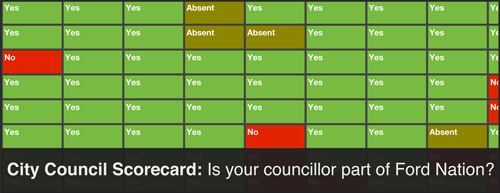So only days after Gordon Chong got caught by Royson James musing about the necessity for road tolls to fund Ford’s much-ballyhooed Sheppard subway, the mayor shut down the idea. “It’s nonsense,” he said. “I don’t support road tolls.”
(Later, Ontario’s Environment Commissioner would champion the idea of road pricing in a report. “We need to reduce the number of single-passenger vehicle trips in the Greater Toronto and Hamilton area,” he said.)
Ford’s unwillingness to consider road pricing isn’t surprising. At the very least, however, Chong’s suggestion of tolls seemed to trigger a bit of reflection from other councillors about the reality of the transit funding situation. Even the Ford-allied Peter Milczyn, who chairs the Planning & Growth committee, told the Toronto Star’s Daniel Dale and Paul Moloney that “development charges are not going to pay for a subway.”
The transit debate continued at City Hall on Monday, as the Planning committee debated two motions relating to transit on Sheppard and Finch.
Over at his blog, Steve Munro does a hell of a job with a blow-by-blow recap of the meeting:
Councillor Joe Mihevc (former TTC Vice-Chair) argued that avoiding discussion now would lead to a finished product being presented for an up-or-down decision with no time for debate or public input. He argued that people affected by the cancellation of Transit City want input into alternative plans now. Stintz replied that Metrolinx is running a series of meetings regarding the Eglinton line, but what these have to do with service on Sheppard and Finch is hard to fathom.
…
As the debate continued, it was clear that Stintz was being too clever for her own good by trying to treat work-to-date as not part of “Transit Cityâ€. This is an example of the gyrations through which Mayor Ford’s team will go to warp history to fit their agenda.
via Think About Transit on Finch and Sheppard, But Not Yet | Steve Munro.
Munro’s summary suggests that Stintz, even as TTC chair, still isn’t playing a significant role in defining the future of transit expansion in the city. It’s not overly surprising that she wouldn’t be able to provide concrete answers on the future of “Transportation City” given that, a couple of months ago, the mayor surprised her by floating the idea of a new subway line on Finch.
So what next? Nobody really knows. Chong has since backpedaled on his earlier comments, telling the CBC that “tolls would be one of the last things that would be considered” to fund subway expansion. He says he’ll have a business case for the privately-funded Sheppard project in a few months. They’ll get some P3 money from the feds, most likely, but that will amount to less than a quarter of the needed funds.
As for Finch? Buses. Fancy buses, maybe. I’d suggest painting a racing stripe on the side to make them look faster.

